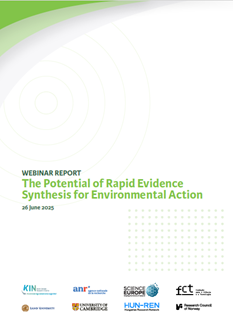
-
Share on
Potential of Rapid Evidence Synthesis for Environmental Action
Rapid evidence synthesis can be defined as “a series of methods that adapts systematic review methods for shorter timelines than for a full systematic review” (ImpSciMethods.org). It can be flexibly delivered in the timeframes required by decision makers, and is policy oriented.
Rapid evidence synthesis has been widely and successfully used in healthcare, notably during the Covid-19 pandemic. Some organisations are also pioneering it for climate, as it can provide practical solutions and approaches based on scientific findings.
Background
The ‘triple planetary crisis’ refers to climate change, pollution, and biodiversity loss (see United Nations Climate Change, 2022). It is a major societal challenge that requires, among others, a steep and consistent decrease in emissions that needs to start right now. The transition to environmental sustainability is also a major opportunity for the future wellbeing of our societies and economies.
Science plays a key role in environmental action, providing analyses of the current situation and trends, as well as practical solutions. These solutions need to be technologically feasible, competitive, and just. They must engage society as a whole and, importantly, be delivered at a pace that is commensurate with the speed of the change that is needed.
More efforts are needed to accelerate science–policy exchange in the field of the environment, as well as to increase the accessibility and practical impact of environmental science. Based on their previous work on science for policy, interdisciplinarity, and environmental sustainability, Science Europe and partners are now exploring how rapid evidence synthesis may represent a useful tool for accelerating innovation uptake in policy and practice.
Organisers
This webinar was co-organised by the Climate Research Initiative Netherlands, Foundation for Science and Technology (FCT), French National Research Agency (ANR), Hungarian Research Network (HUN-REN), Lund University, Research Council of Norway (RCN), University of Cambridge, and Science Europe.

Guiding Questions for the Webinar
- What improvements are needed in the existing science-policy interfaces on climate, environmental pollution, and biodiversity?
- What are potential use cases for rapid evidence synthesis (RES) in environmental science?
- Can RES effectively support evidence-based policy action on the environment, and if yes, what would be the prerequisites for its successful deployment?
- What are the lessons learned from other fields in which RES has been used?
- What are the next possible steps for decision makers, research organisations and other stakeholders?
Report on Exploratory Webinar on the Potential of Rapid Evidence Synthesis for Environmental Action
This report summarises the outcomes of the webinar on 'The Potential of Rapid Evidence Synthesis for Environmental Action.' It highlights key discussions on how rapid and living approaches to synthesising scientific evidence can accelerate environmental action and support evidence-based policymaking.
Moderator & Speakers

MODERATOR
Dr. Eldrid Herrington, Head of Academic Engagement at Centre for Climate Engagement, Hughes Hall, University of Cambridge

Dr. Lidia Borrell-Damián, Secretary General of Science Europe

Dina Eparkhina, Senior Policy Officer at the European Global Ocean Observing System (EuroGOOS)

Professor Dr. Daniela Jacob, Director of Climate Service Center Germany (GERICS) and Honorary Professor at the School of Sustainability, LEUPHANA University Lüneburg

Dr. Ismael Kawooya, Senior Research Scientist and Head of Office at the Center for Rapid Evidence Synthesis (ACRES)

Dr. Jan C. Minx, Head of the Evidence for Climate Solutions Working Group at the Potsdam Institute for Climate Impact Research

Professor Dr. Emily Shuckburgh OBE, Director of Cambridge Zero and Professor of Environmental Data Science, University of Cambridge





